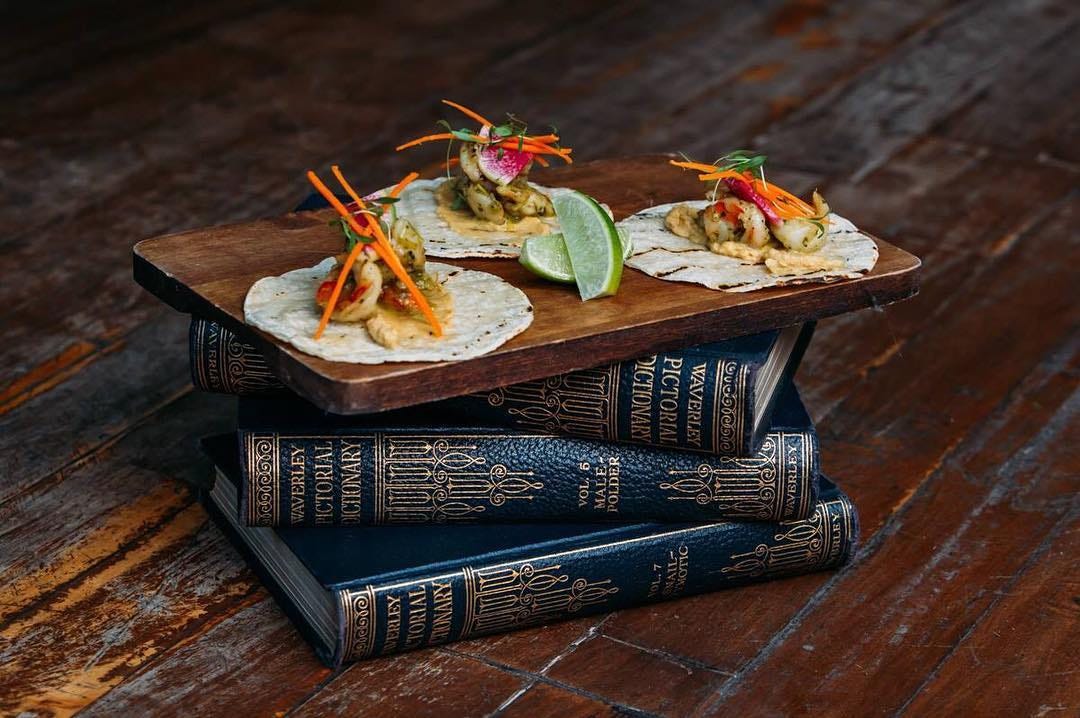Ordinary Citizen, Extraordinary Passion

It was when Jacob started to joke about the ulcer he had — he had nicknamed it something like “Ulcy” — that the romance of cuisine-as-career finally became more than just a televised drama for me.
Like Jim Carrey as Andy Kaufman, laughing off his own mortality as though he were method-acting rather than living, Jacob’s grin and chuckle belied a deeper pain.
He was dying for his art, quite literally.
It may sound cliché, but all too often we downplay the authenticity of real-life experiences deemed “too melodramatic” when in fact those around us live the lives we see on screen every day.
This first drama in particular belongs to executive chef Jacob Wigglesworth. Together with sous chef brother Simon and head-of-service beau Sara, the three are headlining at The Citizen, one of downtown Toronto’s hot spots and a poster child of the city’s ongoing “cuisine over clubbing” revolution.
This drama is admittedly a personal one. I’ve history with the Wigglesworth brothers. The Wigglesworths and Carons, playing at Clintons and Bushs, hail from the same pre-secondary teenage alma mater.
Simon and I are the same age and shared many classes. Jacob was a year younger, and my brother years younger still, but the four of us criss-crossed paths throughout high-school and thereafter in a way that underscores how little the age-gap divide matters post-graduation.
That only proved more true as we spent Tuesday night catching up on location at owner Johnny’s venue, with little effort and lots of laughs.
It was with great pleasure that Jacob walked me through not only his life but his menu. Here I was able to see what all of those years of watching the UK’s Kitchen Nightmares and reading Kitchen Confidential were really worth. As you might expect, not a whole lot.

I’ve never worked in the food service industry; my family was one scornful of both restaurants and the idea of paying others for food preparation. We were raised in a house where eating out was an annual, Mandarin rarity.
And so, because of that upbringing, complemented by a relevant career shift ahead, I sought out in earnest the opportunity to learn of that which I have so taken for granted since the dawn of my rebellious dining out deluge, which has been a bi-daily affair for me since I left mom for university.
Jacob began my lesson not by showing me his menu, nor by demonstrating his excellent spoon-smearing and glaze-clad reductionist skills. Instead, he took me through his inventory management process.
“Each night, I’ll come into the system here”, he explained as he bandied around the different screens of his inventory management tool. “I go through the entire menu and punch in how many of each dish we’re up for selling based on what we have prepped and what’s on-hand raw.”
One of the servers encroached as he tutored me. I looked to her as I inquired about her role.
“So I imagine it’s your job to manage expectations and the customer around what meals are gone for the night should something get 86'd?”
(I’d googled some restaurant terms before I went to visit.)
“You got it,” he responded with the enthusiasm of an earnest teacher watching his ignorant student grow slightly less so.
Perhaps what was most fascinating, though, was his segue into his victories in wholesale costing and retail pricing. He rattled off the profit margins of and the strategies behind his dishes as though they were high scores; he cared just as deeply about the business of cooking as he did the art.
The differentiating factor between a simple cook and an owner-operator of the future, my ignorance suggested.
Of course, it didn’t take long before he was pulling me toward the kitchen and through the stations, and the menus, and the machine he built, a Rube Goldberg of gouda and guacamole and git-’er done.
In line with the stereotype TV taught me, his team stood to attention ever-so-perceivably as he burst into the back and roused his team in my name as they celebrated a friendly coming to visit.
Simon was quick to approach as I saw him for the first time, and he greeted me with a strong shake and a smile. The prospect of the six additional ulcers in the making notwithstanding, the general mood of the kitchen was bright.
Jacob and his team appeared to run a tight ship, at least as far as my ignorant eyes could see. But it was with his girlfriend Sara’s techniques, demeanour, and candor that I was the most taken.
After a stint in the kitchen, I was again led to the front-of-house bar, where Jacob handed me off to Sara. She did not hesitate, and in seconds we were off to learn the front-of-house operations.
Driven in her desire to educate me, she took me through screen after screen and workflow after workflow.
As Jacob was to his menu so too was Sara to the workflow for her staff. She talked me through the nuances of how she’d configured everything in order to streamline as much of the process for her staff as possible.
And like Jacob, she had no time for dawdling. She flung me around the restaurant from section to section, scenario to scenario, with a latent trust that suggested I could keep up with her supersonic pace, which was flattering if not fear-inducing.
By the end, she seemed ready to throw an apron on me, lint-brush my black slacks, and send me off to serve the next table on the spot.
I was left with an impression of her as the consummate and confident leader, which was underscored by the stream of interruptions from servers and the general manager alike. Yet, she aided them in running the restaurant whilst never leaving my side nor slowing her lesson plan’s stride.
The romantic image of back-of-house strategist and figurehead with front-of-house commander-in-chief was not lost on me, nor the writer in me. I was smitten with the two of them, and, truthfully, the operation as a whole.
After a tough day of school, I settled in for a meal. And, as should have been expected by that point, the team at Citizen saw fit to fill my stomach the way they’d filled my mind.
Jacob joined my wife and I and, playing more to his traditional role, proceeded to walk us through our meal while Simon and team in the back worked diligently to produce that which Jacob was quick to pass back the credit for.
We started with an opening salvo of Toronto-mandated tacos, including a shrimp and pulled chicken pairing that lived up to the street cred of a city obsessed with the form factor. The third taco, though, gave he and I pause.

Having a weakness for my beloved “Kung Pao Cauliflower” at my equally beloved Thoroughbred, I went in with hushed anticipation for Jacob’s crispy cauliflower offering. He’d before him a mountain to climb for my affection.
I’m far from an objective eater; my wife calls me an “emotional” one, and I’d happily trade the to-die-for food of a shitty-but-trendy restaurant (increasingly commonplace in Toronto) for the superior service and handiwork of an actual human being.
Thankfully, I was left satisfied with its initial crunch and tingly finish, born from the unique merquén spice.
“Oh man, you’ve got to hear this,” Jacob squealed with glee as he saw my face turn from normal to bruh in celebration of his work. “So this spice, we’re one of the only places in Toronto working with this spice now.”
“Huh, that’s interesting,” I responded. “What’s the deal?”
“We found out about it at this chef’s battle thing. It’s fucking crazy. It’s called ‘The Cartel’, and it was one of the secret ingredients from a previous night. I’m on tap to compete there soon. The dude who sourced it was trying to sell it around, and we jumped right on it!”
Underground chef battles. Rare Chiliéan spice blends. Supply-chain shenanigans. It was a lot to take in, and before I could even begin to process it all, the next dish came — and, with it, another story.

Topped with shredded carrot that was paired with sweet poached pear and savoury scallion-studded hoisin sauce, the duck flatbread serenaded us with its salty-sweet symphony.
“Dude, you don’t even understand. We go through this crazy process with the duck that takes 36 hours to get from prep to your plate.”
He proceeded to walk me through some of the more obtuse but inventive ways his kitchen works with the ingredients to produce the flavours we enjoyed. Fermentation, for example, was a technique they were increasingly leaning on to achieve different results from simple ingredients.
All those episodes of “Cooked” couldn’t hammer home what Jake did for me in that moment. The flatbread I was eating took two days to make, and suddenly, it went from mere cooked food to complex fabrication.
The lot of them — Jacob, Simon, and Sara — had dazzled me, and the staff at the Citizen are due whatever success they’ve had and will have as a result of what can only be considered a young-and-hungry attempt to make a mark on a scene that is increasingly competitive and increasingly challenging.
The rest of the meal, and the night, stands in a haze of three-cheese, cornflake-topped mac and chorizo, superfood salad, deep-friend tequila shots, and from-scratch strawberry-banana sorbet.
And while the food was great, it was the fact that, in just a few hours, I’d learned so much about the business and the people in it that I found myself starving — not just for more of the food but for the chance to meet and learn from amazing people like Jacob and Simon and Sara.
I can’t wait to meet more food folk and hear about their stories and successes and suffering and obscure spices.
That’s exactly why I started this new blog: to profile the food and friends and families I’m setting out to meet as I dive head-first in the restaurant biz to learn and grow and appreciate.
This is going to be fucking awesome.